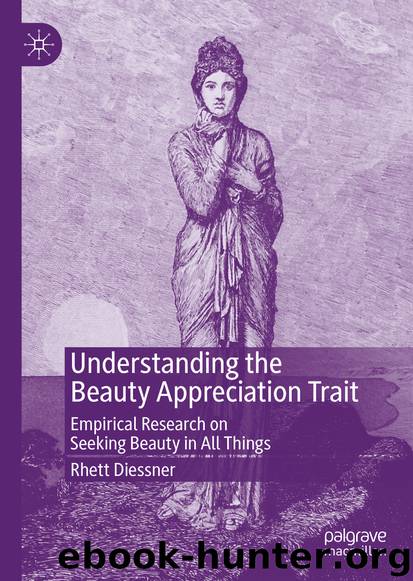Understanding the Beauty Appreciation Trait by Rhett Diessner

Author:Rhett Diessner
Language: eng
Format: epub
ISBN: 9783030323332
Publisher: Springer International Publishing
Beautiful Nature Makes Us Nicer
Jia Wei Zhang and another team of researchers (Zhang, Piff, et al. 2014) produced a series of studies with the auspicious title, “An Occasion for Unselfing: Beautiful Nature Leads to Prosociality.” Hopefully, seeing the word “unselfing” the title will remind you of the philosopher Iris Murdoch, and her emphasis that engagement with beauty makes us less self-oriented and more moral.
In Zhang and Piff et al.’s first study (2014), they established that engagement with natural beauty (EnB, as measured by the EBS, Diessner et al., 2008) is significantly and positively correlated with agreeableness (r = 0.31), perspective-taking (cognitive empathy, r = 0.35), and empathic concern (r = 0.46); even after controlling for levels of connectedness to nature, these relationships remained significant. An earlier study found something similar: the trait of agreeableness was significantly and positively related to EnB (r = 0.26; p < 0.001; Diessner et al., 2013). Conclusion: People who engage with natural beauty are agreeable (nice), they think about others’ needs (cognitive empathy), and they feel for others (emotional empathy).
In their second study, they (Zhang, Piff, et al., 2014) randomly assigned people (real people, not necessarily college students, recruited online through MTurk) to watch ten slides of beautiful nature, and ten slides of not-so-beautiful nature. (They ran a pilot study first to establish these two sets of slides were equivalent on many variables, such as clarity of image, symmetry, complexity, and proportion.) They also gave them measures of positive emotions and again the EnB (Diessner et al., 2008). The participants then played the Dictator game, in which they had the full power to give an anonymous partner some of their points (which they were told could be redeemed for real dollars). Those who watched the more beautiful slides gave away significantly more points to their anonymous partner, indicating that engaging with natural beauty increases our generosity. However, this was mediated by the level of positive emotions a person experienced when looking at the slides of nature. This indicates that beautiful nature probably did not directly cause the prosocial generosity, but rather, EnB through positive emotions, may have done so.
Zhang, Piff, et al.’s (2014) third study was a partial replication of their second study. Again, participants were randomly assigned to watch ten slides of beautiful or less beautiful nature, but this time they used different slides; and they also used a different prosocial game, the trust game. In the trust game, participants were given a chance to give away some of their points to an anonymous partner, and the researchers said they would triple that amount for the partner (thus if you gave your partner 5 of your points, the researchers said they would give the partner 15 points; the points were worth dollars, but only 1 cent a point). Then the trusting part: you were told that at the end of the game your partner had an option to give you back as many points as they wanted to (the idea is that they might feel like they owe you, because they got their points tripled if you gave them anything).
Download
This site does not store any files on its server. We only index and link to content provided by other sites. Please contact the content providers to delete copyright contents if any and email us, we'll remove relevant links or contents immediately.
Rewire Your Anxious Brain by Catherine M. Pittman(18642)
Talking to Strangers by Malcolm Gladwell(13345)
The Art of Thinking Clearly by Rolf Dobelli(10450)
Mindhunter: Inside the FBI's Elite Serial Crime Unit by John E. Douglas & Mark Olshaker(9317)
Becoming Supernatural by Dr. Joe Dispenza(8199)
Change Your Questions, Change Your Life by Marilee Adams(7757)
Nudge - Improving Decisions about Health, Wealth, and Happiness by Thaler Sunstein(7689)
The Road Less Traveled by M. Scott Peck(7592)
The Lost Art of Listening by Michael P. Nichols(7488)
Mastermind: How to Think Like Sherlock Holmes by Maria Konnikova(7320)
Enlightenment Now: The Case for Reason, Science, Humanism, and Progress by Steven Pinker(7306)
Win Bigly by Scott Adams(7183)
The Way of Zen by Alan W. Watts(6600)
Daring Greatly by Brene Brown(6501)
Big Magic: Creative Living Beyond Fear by Elizabeth Gilbert(5754)
Grit by Angela Duckworth(5601)
Ego Is the Enemy by Ryan Holiday(5413)
Men In Love by Nancy Friday(5232)
The Laws of Human Nature by Robert Greene(5171)
